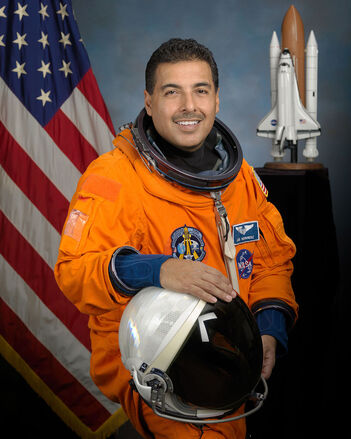|
In October, as the “back to school blush” is off the rose, children in Core Virtues schools focus on the virtues of diligence, perseverance, patience, and self-control. They are being asked to stretch and push themselves “despite difficulty and hardship.” “We choose to go to the Moon in this decade and do the other things, not because they are easy, but because they are hard.” With those words in September 1962, John F. Kennedy summoned American commitment not just to space exploration but to a nearly unimaginable goal – a manned spaceship on the moon before 1970. The task of a lunar landing and safe return of astronauts to Earth was incalculably complex, and the US was playing catch-up ball to the Soviets. JFK announced, “we will not founder in the backwash of the coming age of space; we mean to lead it.” That would require LOTS of scientific progress, technological innovation, national commitment, and most important, hard work. NASA’s scientists, engineers, mathematicians, technicians, and staff would be pushed to their limits. But the payoff would be immeasurable new knowledge, new solutions, new jobs, new discoveries, and much more. Just a month before JFK summoned the national will for space exploration, Julia Hernandez, a Mexican American farm worker in California, gave birth to her fourth child, José Moreno. He joined his hard-working family of migrant workers, and in his school years picked everything from grapes to cucumbers, moving in California with each harvest, his family splitting their time between Mexico and the US. That is -- until his second-grade teacher in Stockton, California came to visit his parents. She had learned the family was getting ready to move on, but she sensed promise in José. She stressed the importance of stability for the education of their children. Julia and Salvador Hernandez took her counsel to heart, settling in Stockton.  José said that on that day, his life changed forever. He continued to help his family but excelled in school. Inspired by the Apollo 17 moonwalks at age ten, he looked up at the stars at night and longed to be part of space exploration. He went on to earn a bachelor’s in electrical engineering, then a master’s degree in electrical and computer engineering. But his childhood dream of becoming an astronaut eluded him. José applied to NASA’s astronaut program not once, not twice, but twelve times. He was rejected eleven times. But this poster child for perseverance was undeterred. He kept studying, sharpening his skills, and increasing his chances. In May 2004, he was accepted into the astronaut training program! He trained hard, and by July 2008 was assigned to the crew of Space Shuttle Mission STS-128 to the International Space Station. As a mission specialist aboard, he realized his childhood dream of space exploration and, in the process, became the first Latino migrant worker to ever become an astronaut. José (who is now 62) has some advice for young people who have big dreams, but face great obstacles. “Don’t be so quick to give up on your dreams if you fail once or twice; sure, failure doesn’t feel good, sure, rejection doesn’t feel good, but if you prepare yourself, you come back stronger and eventually, you’ll get there.” José did.
And fortunately for all of us, Amazon wants to spread the word of his success. Their new original movie “A Million Miles Away” tells his story, and for the most part accurately (according to José). It’s a tale of incredible perseverance, hope, courage, and diligent pursuit of dreams. It’s an inspiration for kids and adults of all backgrounds. In October, as the “back to school blush” is off the rose, children in Core Virtues schools focus on the virtues of diligence, perseverance, patience, and self-control. They are being asked to stretch and push themselves “despite difficulty and hardship.” In other words: we choose to master reading in the first grade, long division in the fourth grade, essay-writing in the sixth grade, not because it is easy, but because it is hard. Go for it, kids! Mary Beth Klee José has told his own story for young adults in his memoir From Farmworker to Astronaut (Piñata Books, October 2019).
0 Comments
September is the month that lifts hearts across the nation – especially the hearts of parents! But for those of us on the inside of schools, it’s also a time of hope. When students and teachers file into their new classrooms and launch a new school year, it’s hard not to feel a bubble of excitement, expectation, and joy. Good things are about to happen. At Core Virtues this month, we’re reflecting on one source of our shared community hope: respect for all those we serve. The Core Virtues program was conceived at a time of political division (1992: think impeachment of Bill Clinton) but from the outset we committed ourselves to non-partisanship. Core Virtues serves families from across the social, economic, and political spectrum. Our mission is and has been to cultivate time-honored, widely shared, consensus-based virtues in the classroom and to eschew contemporary hot buttons that divide us. We chose this path mindful of the fact that ours is a boisterous, complex, and often messy nation, but that those we serve in this rowdy republic are likely to agree on certain key virtues. (The list of the virtues we promote through literature can be found here.) Respect for our families’ freedom – for their diverse beliefs and identity, and humility about the limits of our own understanding, demand that our schools hew to this truly rich consensus. Hundreds of books on this site exemplify and exalt the virtues that unite us without whitewashing a past that has sometimes divided us. Now more than ever, Core Virtues schools commit to respect those they serve – a rich and diverse cross-section of the American people. The "core" virtues are what we promote.
The cultivation of virtue will lead our students down diverse paths and even
to different political conclusions, but our program (while consistent with the virtues) is respectful of all we serve. Like the U.S. Supreme Court, we see parents as the primary educators of their children and schools as a place of common ground for all – the religiously observant, the professed atheist, the secular humanist, and the indifferent. Our nation’s greatest need right now is for mutual respect and civil dialogue. By practicing respect for all we serve, the Core Virtues program aims to promote those ends. We hope schools and parents find it a source of hope. Mary Beth Klee |
AuthorWrite something about yourself. No need to be fancy, just an overview. Archives
July 2024
Categories |
